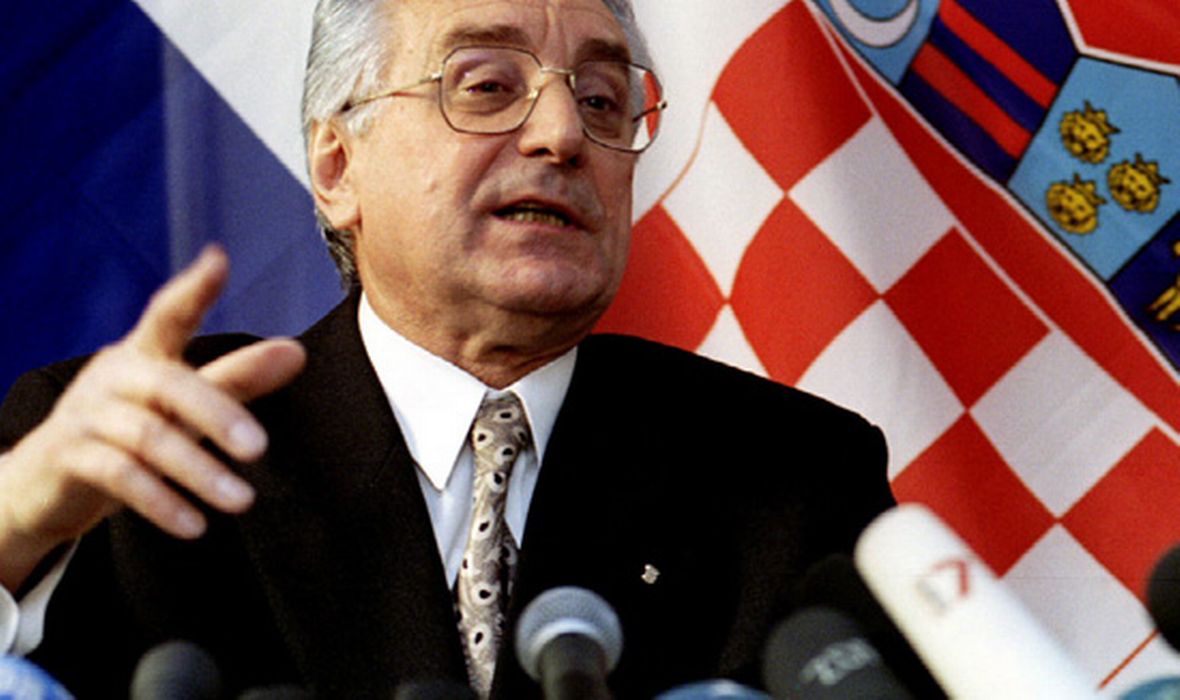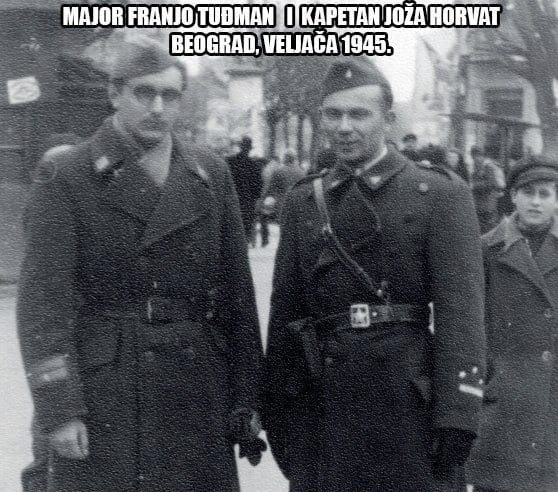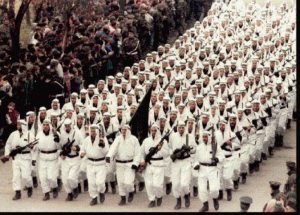
Views: 1875
 A Yugoslav Communist Major Franjo Tuđman (left) with his Croatian compatriot Communist Captain Joža Horvat (right) as the occupants of Serbia’s capital Belgrade in February 1945. The Yugoslav Communist Partisans came from the territory of a Nazi-fascist Independent State of Croatia to occupy Serbia in October 1944. They were sponsored and supported by the Croatian Nazi-fascist regime in Zagreb. Top Partisan’s leadership was not Serb but rather Croat. The Partisans were accompanied at that time by many redressed Croatian Nazi-fascist soldiers (Ustashi and Domobrans) who committed a terrible genocide on Serbian civilians in Croatia and Bosnia-Herzegovina in WWII. Those Partisans continued to exterminate Serbs in Serbia since October 1944 till the end of 1945 when circa 70.000 Serbi’s citizens were killed by them. Franjo Tuđman was during the first months of the WWII a member of the Ustashi Nazi-fascist detachments before he joined the Partizans under the supreme command of Josip Broz Tito who was of Croatian-Slovenian origin. Franjo Tuđman later became a General of the Yugoslav People’s Army and the President of reborn WWII Nazi-fascist Croatia in the 1990s. Under Tuđman presidency, more than 300.000 ethnic Serbs were expelled from Croatia followed by circa 10.000 killed. Today, Croatia is one of the most ethnically cleansed states in Europe.
A Yugoslav Communist Major Franjo Tuđman (left) with his Croatian compatriot Communist Captain Joža Horvat (right) as the occupants of Serbia’s capital Belgrade in February 1945. The Yugoslav Communist Partisans came from the territory of a Nazi-fascist Independent State of Croatia to occupy Serbia in October 1944. They were sponsored and supported by the Croatian Nazi-fascist regime in Zagreb. Top Partisan’s leadership was not Serb but rather Croat. The Partisans were accompanied at that time by many redressed Croatian Nazi-fascist soldiers (Ustashi and Domobrans) who committed a terrible genocide on Serbian civilians in Croatia and Bosnia-Herzegovina in WWII. Those Partisans continued to exterminate Serbs in Serbia since October 1944 till the end of 1945 when circa 70.000 Serbi’s citizens were killed by them. Franjo Tuđman was during the first months of the WWII a member of the Ustashi Nazi-fascist detachments before he joined the Partizans under the supreme command of Josip Broz Tito who was of Croatian-Slovenian origin. Franjo Tuđman later became a General of the Yugoslav People’s Army and the President of reborn WWII Nazi-fascist Croatia in the 1990s. Under Tuđman presidency, more than 300.000 ethnic Serbs were expelled from Croatia followed by circa 10.000 killed. Today, Croatia is one of the most ethnically cleansed states in Europe.
 Killed civilians in Belgrade 1945 by Franjo Tuđman’s Partisans. Their flats and houses are confiscated and settled by the Partisan officers and the party’s officials
Killed civilians in Belgrade 1945 by Franjo Tuđman’s Partisans. Their flats and houses are confiscated and settled by the Partisan officers and the party’s officials
Origins of images: Facebook, Twitter, Wikimedia, Wikipedia, Flickr, Google, Imageinjection & Pinterest.
Read our Disclaimer/Legal Statement!
Donate to Support Us
We would like to ask you to consider a small donation to help our team keep working. We accept no advertising and rely only on you, our readers, to keep us digging the truth on history, global politics and international relations.
 Franjo Tuđman’s “democratic and European” Croatia: A Croat family in the uniforms of the WWII Nazi-fascist Ustashi detachments
Franjo Tuđman’s “democratic and European” Croatia: A Croat family in the uniforms of the WWII Nazi-fascist Ustashi detachments








